In this double-bill episode of The Genetics Podcast, Dr. Patrick Short talks to two key rare disease researchers in the field: Dr. Bruce Bloom, CCO of Healx, and Dr. Mike Tranfaglia, CSO of FRAXA. Both draw on their wide-ranging personal and professional experiences to discuss the successes and opportunities of drug repurposing, the power of using machine learning, and the work they’ve been doing to aid in finding effective treatments for Fragile X.
Read moreResearch Updates
Less Active Immune System Evident in Fragile X Patients, Study Suggests

People with Fragile X syndrome are more likely to develop infections, but are less susceptible to autoimmune disorders than the overall population, a new study found. Taken together, this suggests that the immune system is underactive in this patient population. The study, titled, “The phenotypical implications of immune dysregulation in Fragile X syndrome,” was published in the European Journal of Neurology.
Read moreResults Reported: Using EEG Responses to Sound for Fragile X Drug Discovery

Jonathan Lovelace, a FRAXA funded Postdoc at UC Riverside, has made some exciting EEG findings over the past few years studying auditory hypersensitivity in mice and therapeutic drug treatments. A big obstacle in FXS research has been establishing reliable, unbiased, and translation relevant biomarkers that can be used to determine the effectiveness of therapies. One of the most important discoveries they have made is the striking similarity in EEG biomarkers between mice and humans.
Read moreShould You Participate in a Fragile X Clinical Trial?

A Fragile X clinical trial of a new PDE4D allosteric inhibitor from Tetra Therapeutics is nearly complete. Right now there are 3 remaining spots open to males 18-45 years of age with Fragile X syndrome. Dr. Elizabeth Berry-Kravis at the Rush University Medical Center in Chicago is leading this trial. The drug being studied has a unique mechanism of action that might improve cognitive and memory function.
Read moreNew Partners Aim to Accelerate the Discovery and Repurposing of Medicines for Rare Neurological Diseases

First Healx secured $56M in new financing to launch a global Rare Treatment Accelerator program to tackle Fragile X syndrome and 39 other rare diseases. Now they have built a partnership with Boehringer Ingelheim worth millions. It all started with a small FRAXA grant to Healx to repurpose available drugs for Fragile X.
Read moreGanaxolone Fragile X Clinical Trial Showed Disappointing Results

Ganaxolone, an experimental drug from Marinus Pharmaceuticals which targets GABA receptors, did not show promise for Fragile X syndrome in a clinical trial.
Read moreFXS Patients’ Social Deficits are Linked to Social Anxiety, Eye-tracking Study Says

Dr. Craig Erickson and colleagues at the University of Cincinnati used eye-tracking technology to understand sociability in Fragile X syndrome. This study affirms what so many parents, caretakers, and educators suspect: people with fragile X want to be social, and it is anxiety – not lack of interest – which usually hold them back. If anxiety could be reduced, more sociability would likely follow. Dr. Erickson is a Fragile X expert and FRAXA investigator who is currently conducting a Fragile X clinical trial of an investigational new drug.
Read moreFragile X Research has More Runners in the Race

We asked for your help to get more runners in the race to find effective treatments and a cure for Fragile X, and you came through for us. Thank you all so much! FRAXA’s 2018 year-end annual appeal raised $733,017 to fund new Fragile X research!
Read moreTetra Announces $40M to Advance BPN14770 for FXS and Alzheimer’s Disease

Tetra Discovery Partners has signed a multi-part deal that could bring it up to $160 million, plus royalties, from Shionogi & Co, Ltd, a Japanese major research-driven pharmaceutical company. Tetra currently is conducting an investigational Phase 2 study of BPN14770 in adults with Fragile X Syndrome, an indication for which BPN14770 has received Orphan Drug Designation from the US Food and Drug Administration. This clinical trial was made possible by early work with the FRAXA-DVI and over $200,000 from FRAXA.
Read moreDrug Duo Delivers Brain, Behavioral Benefits for Fragile X Syndrome
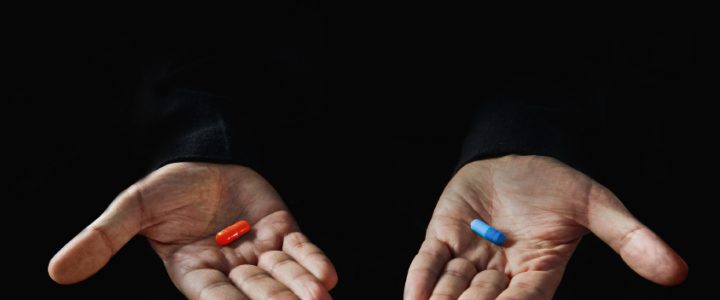
Administering a cholesterol drug alongside an antibiotic eases atypical behavior and restores the signaling balance in the brains of people with fragile X syndrome.
Read moreSpectrum News – Newly Discovered Aspects of Fragile X Spur Next Wave of Drugs

Many drugs for Fragile X syndrome have failed in large clinical trials, but candidates that target new aspects of the condition may fare better.
Read moreNon-Invasive Imaging as a Biomarker for Fragile X Clinical Trials
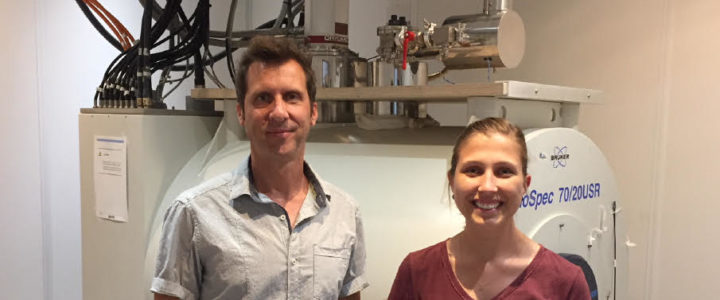
FRAXA Research Foundation has renewed Kamila Castro’s 2017 FRAXA Fellowship for a second year. With this $90,000 award, Kamila Castro and Principal Investigator Dr. Andreas Frick are using non-invasive magnetic resonance imaging (MRI) methodology to assess connectivity changes in the brain in Fragile X. If this project is successful, we will have objective outcome measures to evaluate new treatments, both in mice bred to mimic Fragile X and in human patients.
Read moreMega Green Tea Extract to Treat Fragile X?

Green tea is thought to have many benefits, particularly in cognitive function. In 2012-14, FRAXA Research Foundation funded a clinical trial to assess the effects of EGCG (green tea extract) on cognitive function in adults with FXS. Drs. Rafael de la Torre and Mara Dierssen Sotos, principal researchers in Barcelona, Spain, reported memory, attention, and mental flexibility improvements.
Read moreHow Promising is CRISPR for Fragile X?

Peter Todd, MD, PhD, Assistant Professor in the Department of Neurology in the University of Michigan Medical School, was awarded a FRAXA Research Grant for gene reactivation with the use of CRISPR. In this interview he tells us about CRISPR in Fragile X research, how realistic is it that it could turn the Fragile X gene back on, and if it can really cure Fragile X.
Read moreRetinoic Acid Signaling is Blocked by Fragile X Mutation
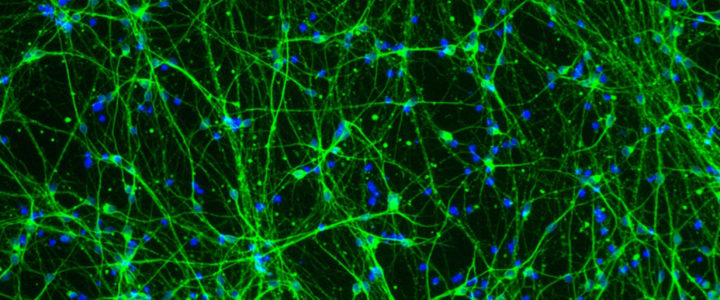
With a 2013-2014 FRAXA Research Grant, Principal Investigator Marius Wernig, PhD and FRAXA Fellow Samuele Marro, PhD at Stanford University found that the Fragile X mutation impairs homeostatic plasticity in human neurons, by blocking synaptic retinoic acid signaling. Retinoic acid is a metabolite of Vitamin A. The system they have developed could provide a powerful new cellular biomarker for screening many treatment approaches.
Read moreAripiprazole as a Treatment for Fragile X Syndrome
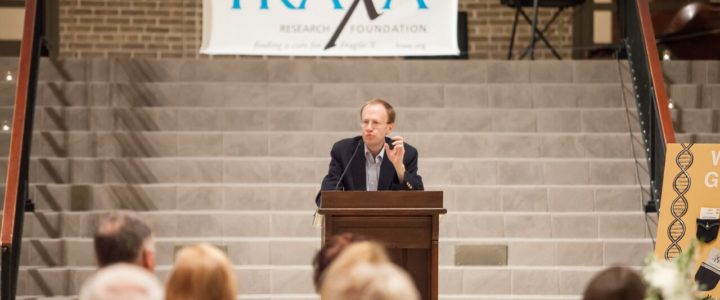
Many medications are used to help people with Fragile X cope. But few clinical trials have been done on these drugs. Years ago FRAXA funded Dr. Craig Erickson to run a trial of aripiprazole (aka Abilify). FRAXA guest writer Hannah Miles recently caught up with Dr. Erickson to learn the results of the trial.
Read moreStudy Examines Behavioral Traits of Fragile X Patients Without Autism

Patients with Fragile X syndrome who don’t meet the cut-off for a diagnosis of autism show a decrease in impulsivity and repetitive questioning over time, when compared with patients who do, a new study shows.
Read moreLysogene Partners with FRAXA Investigator Dr. Hervé Moine to Develop Gene Therapy for Fragile X

A research project funded by FRAXA has led to new fragile x gene therapy initiative, this time in France. Lysogene, a French biopharmaceutical company working to develop gene therapy treatments for brain disorders, is partnering with FRAXA Investigator Dr. Herve Moine to tackle Fragile X syndrome.
Read moreFRAXA Research Grants Drive Big Investments in Fragile X
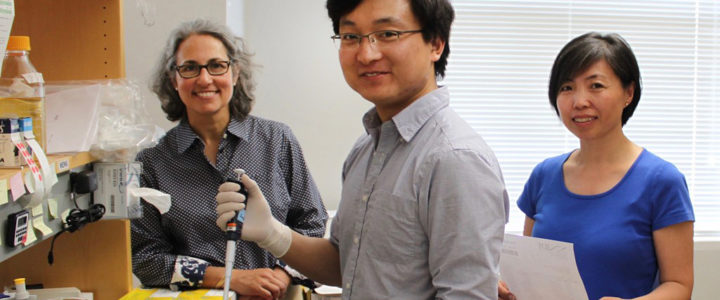
Most people know that FRAXA supports academic research at many institutions such as Harvard University, University of Pennsylvania, Massachusetts Institute of Technology, and Yale University. However, FRAXA is also working with more than 30 pharmaceutical companies around the world. Mike spends a lot of his time advising and collaborating with industry partners.
Read moreCan CRISPR Cure Fragile X Syndrome?
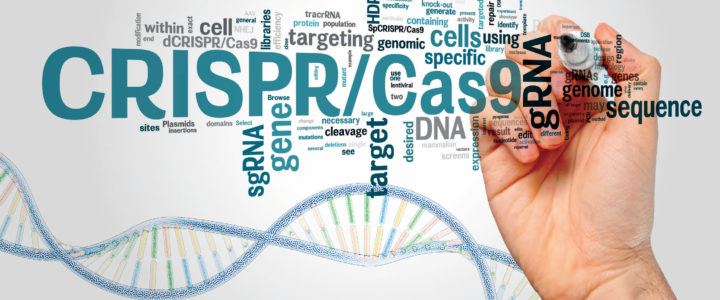
CRISPR/Cas9 was used by MIT researchers to remove the molecular tags that keep the mutant gene shut off in Fragile X syndrome neurons and resulted in some of them producing protein normally. Much work is being done right now, with exciting new discoveries coming at a fast and furious pace.
Read moreCRISPR Reactivation of the Fragile X Gene
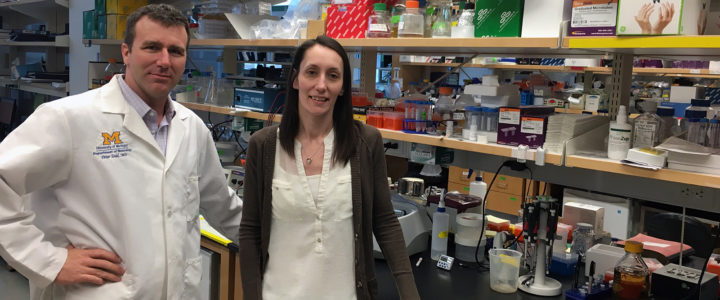
“We are trying to target the first event that goes wrong in Fragile X syndrome”, says Todd, “One reason our previous attempts to develop treatments for Fragile X syndrome have failed is that they’ve tried to target the downstream effects of losing the Fragile X protein. The protein does many things… bypassing all the functions that it normally takes care of has proven difficult from a pharmacologic perspective.”
Read moreNewly Discovered Regulatory Pathways in Fragile X

Studies at Yale University and elsewhere are showing that FMRP plays a significant role in the regulation of potassium channels. Looking forward, potassium channel opener drugs could rescue some symptoms of Fragile X in humans.
Read moreDrug Repurposing Study Results Accelerate Progress Towards Fragile X Treatments

While there are over 8,000 rare diseases affecting an estimated 350 million people worldwide, only around 200 of these conditions have effective treatments. Due to the high cost of developing new drugs, rare diseases have historically been less attractive to pharmaceutical companies. Drug repurposing systematically leverages the detailed information available on approved drugs and reduces the time and money needed to deliver safe “new” treatments, but with greater success rates and a potentially more immediate impact on health care.
Read moreIn Their Own Words: Reports From the International Fragile X Workshop

The 18th International Fragile X and Related Neurodevelopmental Disorders Workshop in Quebec, Canada, was a great success, featuring Fragile X much more heavily than any previous meeting in this series! We asked our speakers to summarize their work in their own words, with brief updates from researchers investigating Fragile X.
Read moreBrain Imbalance Target of Dr. Erickson’s New Clinical Trial

According to Dr. Erickson, AZD7325 is a drug that selectively boosts GABA neurotransmission in the brain. GABA is the primary neurochemical in the brain that blocks brain activation. GABA activity is in balance in the brain with Glutamate activity, which is the primary neurochemical that causes brain activation. In Fragile X, GABA activity is insufficient and glutamate activity is excessive, likely causing brain activity to be out of balance. AZD7325 attempts to correct parts of this imbalance by boosting the insufficient GABA activity in the brains of people with Fragile X.
Read more
